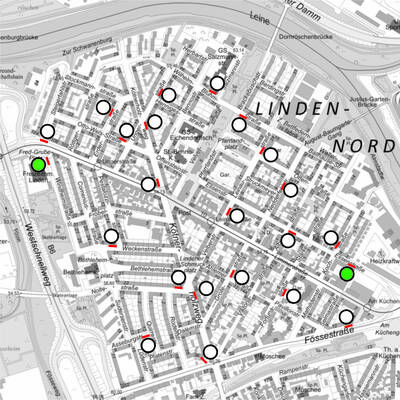Identification of Logistic Stopping Points in Big Vehicle Trajectory Data
 © M. Karakulina
© M. Karakulina
| Leitung: | Sester, Feuerhake, Wage, Koetsier |
| Team: | M. Karakulina |
| Jahr: | 2021 |
| Ist abgeschlossen: | ja |
| Weitere Informationen | https://www.hannover.de/Urbane-Logistik-Hannover/Pilotquartiere/Pilotquartier-Linden-Nord |
Identification of Logistic Stopping Points in Big Vehicle Trajectory Data



The advance in positioning technologies has facilitated the generation of spatio-temporal data representing the mobility of different objects in geographical space, namely trajectories. Trajectory data mining, especially on trajectory datasets of immense volume, allows improving traffic problems by analyzing spatio-temporal events. Double (second-row) parking is an example of unusual stopping events, which are often caused by parcel delivery vehicles. One of the solutions for the elimination of second-row parking situations created by parcel providers and their additional consequences, such as potential traffic jams, is the provision of spatial parking spaces for parcel services, so-called logistic stopping points. The objective of this thesis is to suggest logistic stopping points for the Hannover region based on trajectory information generated by parcel delivery providers. The delivery trajectories have to be extracted from the provided big vehicle trajectory dataset. As the result, 4030 trajectories and 46, 589 stops are determined as delivery. Based on the obtained delivery stop information, 2018 logistic stopping points for parcel provider services are suggested for the Hannover region. Additionally, an algorithm for second-row parking situation detection is implemented. The algorithm is applied to the delivery stops that happened in the Linden-Nord district of Hannover. The analysis of the results of this work shows that 80% of the detected second-row parking situations could have been prevented by establishing the suggested logistic stopping points.










